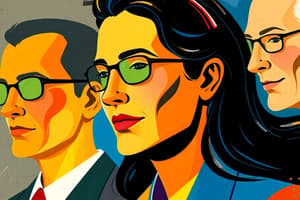Podcast
Questions and Answers
What distinguishes the focus of leaders from that of managers?
What distinguishes the focus of leaders from that of managers?
- Leaders maintain the status quo.
- Leaders focus on achieving organizational goals.
- Leaders focus on people. (correct)
- Leaders focus on system and structure.
Which of the following traits is NOT commonly associated with trait theories of leadership?
Which of the following traits is NOT commonly associated with trait theories of leadership?
- Initiative
- Dependability
- Intelligence
- Creativity (correct)
How do leaders typically behave compared to managers regarding change?
How do leaders typically behave compared to managers regarding change?
- Leaders accept the status quo; managers challenge it.
- Leaders implement systems; managers develop relationships.
- Leaders focus solely on the bottom line; managers look ahead.
- Leaders challenge the status quo; managers maintain it. (correct)
Which of the following best describes the emotional involvement of leaders compared to managers?
Which of the following best describes the emotional involvement of leaders compared to managers?
Which of the following functions is primarily associated with leadership?
Which of the following functions is primarily associated with leadership?
What is a common misconception about the relationship between leadership traits and effectiveness?
What is a common misconception about the relationship between leadership traits and effectiveness?
In what way do managers typically differ in their views on objectives compared to leaders?
In what way do managers typically differ in their views on objectives compared to leaders?
What does the political function of leadership refer to?
What does the political function of leadership refer to?
Flashcards
Leadership
Leadership
Interpersonal influence used in a situation, guided by communication, to achieve a goal.
Leadership Functions
Leadership Functions
Key aspects of leadership, including task completion, performance culture, symbolic representation, political role, and relationships with followers.
Manager vs. Leader
Manager vs. Leader
Managers focus on achieving organizational goals, while leaders aim to develop new objectives; managers have short-term views, leaders have long-term vision; managers copy, leaders innovate; managers maintain, leaders develop.
Trait Theories of Leadership
Trait Theories of Leadership
Signup and view all the flashcards
Manager Characteristics
Manager Characteristics
Signup and view all the flashcards
Leader Characteristics
Leader Characteristics
Signup and view all the flashcards
Leadership Trait Examples
Leadership Trait Examples
Signup and view all the flashcards
Trait Theory Limitations
Trait Theory Limitations
Signup and view all the flashcards
Study Notes
Leadership
- Leadership is an interpersonal influence process, exerted in a situation, directed toward a specific goal. It's a social influence process where one person gets support from others to achieve a task.
- Leadership functions include task completion, creating and maintaining a performance culture, symbolic representation, and political relations with outsiders and relational aspects.
- Leaders differ from managers in their approach to goals. Leaders aim for long-term objectives, and are creative, focused on people, and challenging, unlike managers, focused on short-term goals and current systems.
- Leaders do not just maintain systems but develop them
Differences Between Managers and Leaders
- Goals: Managers achieve organizational goals, while leaders establish new objectives.
- Perspective: Managers have short-term views, leaders have long-term perspectives.
- Creativity and Approach: Managers copy others; leaders create original approaches.
- Focus: Managers focus on systems and structure; Leaders focus on people.
- Action: Managers implement; Leaders shape.
- Relationships: Managers rely on control; Leaders create trust.
- Priorities: Managers focus on the bottom line; Leaders look to the future.
- Flexibility: Managers accept the status quo; Leaders challenge it.
- Actions: Managers do things right; Leaders do the right thing.
- Personal Involvement: Managers are impersonal about goals, leaders exhibit personal action.
- Motivation: Managers coordinate and balance; Leaders foster excitement and acceptance.
- Emotional Involvement: Managers have low emotional involvement; Leaders have empathy
Traits Theories of Leadership
- Identifying characteristics that unify great leaders.
- Some leadership characteristics include: initiative, dependability, lateral thinking ability, self-assurance, maturity, visionary ability, social well-being, need for achievement, and goal-directedness.
- These characteristics are sometimes difficult to measure and their importance varies. It also ignores relationships with subordinates.
Studying That Suits You
Use AI to generate personalized quizzes and flashcards to suit your learning preferences.




